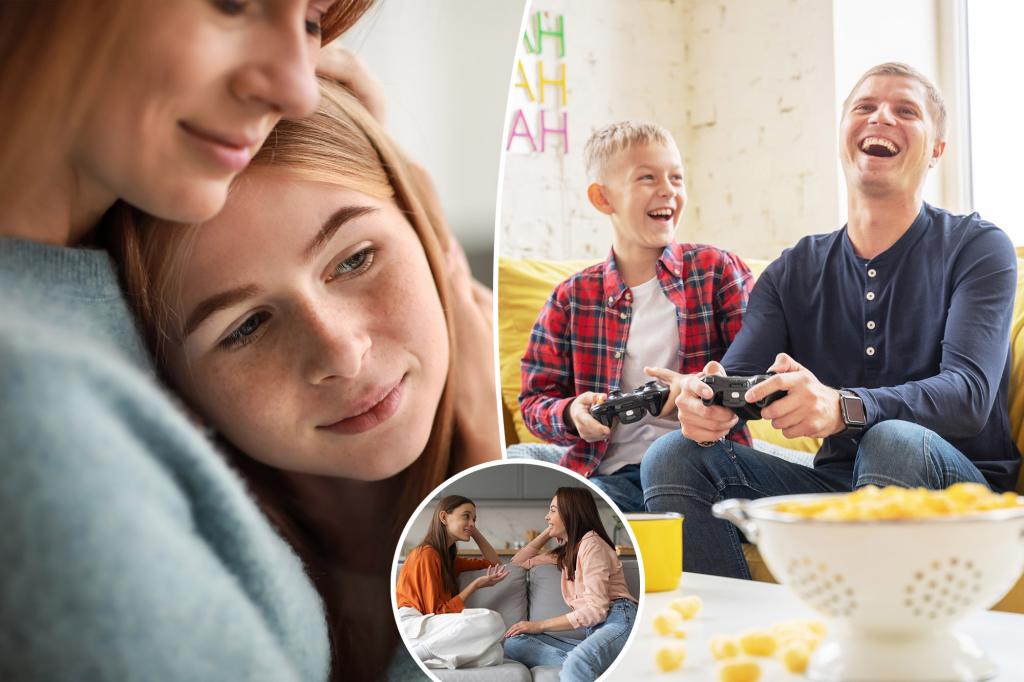When Mom Becomes Your Best Friend: The Hidden Dangers of Parentification
The idea of having your mother as your closest confidante might seem like the perfect relationship—a notion often glamorized in popular television shows like “Gilmore Girls,” “Jane the Virgin,” and “Ginny and Georgia.” These shows portray mother-daughter relationships characterized by friendship, openness, and shared experiences that many viewers might envy. “I think a lot of people see these kinds of relationships on TV and wish their mom was ‘cooler,'” explains Dr. Dara Winley, a Chicago-based therapist and assistant professor at Adler University. However, mental health professionals caution that this romanticized dynamic often masks a problematic psychological phenomenon called parentification—a role reversal where children shoulder responsibilities and emotional burdens that should belong to adults. This boundary-blurring relationship, while seemingly close and special, can actually inflict long-lasting psychological harm on children who are forced to grow up too quickly.
Parentification occurs when children take on responsibilities that aren’t “developmentally appropriate” for their age, according to the Cleveland Clinic. This role reversal manifests in various ways: children might become caregivers for younger siblings, mediators during parental conflicts, or emotional confidants for their parents’ personal problems. Some children become privy to adult concerns like a parent’s dating life or financial struggles—information that can burden young minds not equipped to process such complex issues. In more extreme cases, children essentially run the household due to physically or emotionally absent parents. Psychology Today describes parentification as a situation where minors become their parents’ emotional caretakers “based on the parent’s inability to manage their own emotions and sufficiently care for their child.” This dynamic fundamentally disrupts the natural parent-child relationship, where adults should provide security and emotional support to their children—not the other way around.
Dr. Winley notes that parentification rarely stems from malicious intent. Rather, it often results from unstable family environments and blurred boundaries. Some parents resort to parentification because they themselves never learned healthy emotional regulation or experienced similar dynamics in their own childhood, creating a generational pattern of inappropriate emotional dependence. They may genuinely believe that children should help shoulder adult emotional burdens. In other cases, practical circumstances drive this dynamic—single parents or those working multiple jobs might have no choice but to rely on their children for household management or sibling care. While the reasons behind parentification vary widely, the impact on children remains consistently problematic, robbing them of crucial developmental experiences and forcing them into roles they’re not emotionally equipped to handle.
The consequences of parentification can be far-reaching and severe for children’s development. Dr. Kate Eshleman, a psychologist quoted by the Cleveland Clinic, explains: “Overall, parentification can be difficult for the child. It doesn’t always allow kids to go through developmental phases if they’re having to provide either logistical, tangible or emotional support to a parent or to others.” When children are preoccupied with adult responsibilities—whether managing household tasks, serving as emotional support for parents, or caring for siblings—they miss out on age-appropriate activities essential for healthy development. Their focus shifts away from friendships, academic growth, and normal childhood experiences toward adult concerns beyond their maturity level. This premature leap into adult responsibilities often means sacrificing the carefree exploration and social development that should characterize childhood and adolescence, creating gaps in emotional and social growth that can persist into adulthood.
The strain of parentification frequently manifests in physical symptoms, particularly in younger children who lack the emotional vocabulary to express their distress. Children may experience chronic headaches, stomach problems, sleep disturbances, and diminished appetite—all physical manifestations of psychological overwhelm. “When a child has physical complaints, there is evidence that it can be related to their emotional health,” Dr. Eshleman points out. “For a young child or adolescent who may not have the ability to recognize their own emotions and stresses, it may manifest as physical symptoms.” These physical manifestations serve as important warning signs that a child is struggling under the weight of inappropriate responsibilities. The body often signals what the mind cannot yet articulate—that the child is operating under chronic stress that exceeds their developmental capacity to manage effectively.
While media portrayals often glamorize close mother-child friendships, mental health professionals encourage a more balanced perspective that maintains appropriate generational boundaries. The ideal parent-child relationship involves parents who provide guidance, support, and appropriate levels of independence while remaining the primary emotional caretakers in the relationship. Parents can maintain warm, loving relationships with their children without burdening them with adult problems or responsibilities. Breaking cycles of parentification often requires conscious effort and sometimes professional support, particularly for parents who experienced similar dynamics in their own upbringing. By recognizing the warning signs of parentification—such as children who seem unusually responsible, worry excessively about adult matters, or display physical symptoms of stress—families can work toward healthier relationship patterns that allow children to fully experience each developmental stage. Ultimately, children need parents who act as parents, not best friends who share adult burdens that young minds aren’t ready to bear.













